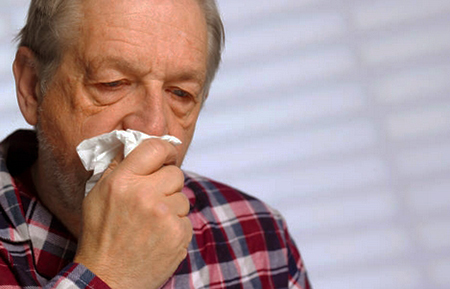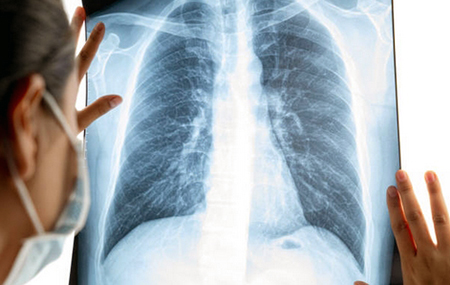Bronchitis in adults: symptoms, causes, treatment


The function of the bronchi in the human body is to transport oxygenated air to the alveoli for gas exchange. With diseases of the respiratory system, this process is disrupted. The reverse removal of carbon dioxide is also carried out through the bronchi. When an inflammatory process appears in them, a cough appears. Bronchitis is a disease of the lower respiratory tract, predominantly of an infectious nature. Often occurs against the background of acute respiratory viral infections or colds. With timely treatment, the risk of complications is minimal.
Short information about bronchitis
Symptoms and signs of bronchitis
Bronchitis in adults is of two types: acute and chronic, catarrhal and purulent, obstructive and non-obstructive. One main symptom unites all forms of the disease - cough. In the first 2-3 days, it is obsessive, dry or with little phlegm. After a few days, bronchitis begins to transform symptoms. The separation of sputum is more intensive. A productive cough is a more accurate definition of this process. The sputum is predominantly whitish-gray and transparent, but when a bacterial infection is attached, it can be yellowish-green.
Bronchitis symptoms in adults are as follows:
- General intoxication of the body (weakness, drowsiness, loss of appetite);
- Slightly increased body temperature - 37-38 C (98.6 – 100.4);
- Chest pain.
Features of symptoms in different forms of bronchitis

Acute bronchitis in adults is accompanied by more than a cough. The disease can occur as a complication of the flu. The temperature with this type of bronchitis can rise to 40 C (104 F). The symptoms are joined by hard breathing and wheezing, shortness of breath in severe condition, chills. Chronic bronchitis has a scanty discharge of mucopurulent or just mucous sputum. Of the total number of diagnoses, the acute form of the disease is diagnosed in 72% of cases. The exacerbation of the chronic stage accounts for only 15%.
Causes of bronchitis occurrence and development
Statistics show that bronchitis in adults occurs in 80-90% due to the infectious nature of the origin. It is extremely rare that lung bronchitis can develop as an independent disease. Typical causes of the onset and development of the disease are:
- Bacteria (pneumococci, staphylococci, streptococci);
- Viruses (parainfluenza, adenoviruses, etc.);
- Nasopharyngeal infections (sinusitis, adenoiditis, tonsillitis);
- Allergic predisposition;
- Frequent hypothermia of the body;
- Congestion in the lungs;
- Polluted air and smoking.
Infection routes
Acute bronchitis occurs against the background of infectious viral and bacterial diseases. And it is this form of the disease that is contagious for healthy people with the classic airborne transmission method. This happens in the process of coughing, sneezing, talking with the patient. Acute bronchitis can only be prevented by limiting contact with coughing people. It is not recommended to share dishes and towels with a sick person. Only a cough of an allergic origin can be non-infectious.
Disease risk factors

Bronchitis develops against the background of provoking factors. Risk groups also follow from this. It contains people working in hazardous industries, where they have to come into contact with dust, harmful toxic fumes and, in general, with polluted air. People over 50 are at risk. Bronchitis symptoms manifest in the form of frequent relapses in people with nicotine and alcohol addiction. People with low immunity are also at risk. When viruses and microbes enter the body, there are simply not enough resources to suppress them.
List of major bronchitis complications
Signs of bronchitis make it clear that it is impossible to delay treatment. A complication in the form of a prolonged illness leads to its chronic condition. There will be a struggle with a painful cough for weeks. Chronic bronchitis should not be allowed to take its course, it also needs to be treated. Obstructive or acute bronchitis provokes a number of complications that require special attention. Whether they arise depends on immunity, timeliness of therapy and adherence to medical recommendations.
The group of complications includes:
- Pneumonia;
- Cystic fibrosis;
- Asthma and bronchiectasis;
- Violation of the heart rhythm;
- Chronic obstructive pulmonary disease.
When to see a doctor?
Bronchitis symptoms and treatment in adults require medical supervision. Cough is the first reason why you need to make an appointment with a doctor.
The cough may be dry for the first 2-3 days, gradually becoming productive. If this is joined by poor health in the form of weakness and drowsiness, you must not delay the visit to a doctor in no case.
In about 5% of cases, a secondary infection is added.
Obstructive bronchitis differs from acute bronchitis in pathogenesis, etiology and therapy. Self-treatment can lead to serious complications.
Preparing for a visit to a doctor
Bronchitis is treated by a physician specializing in pulmonology. The visit does not require special preparation.
Diagnosis of bronchitis in adults

How to cure bronchitis is a question that the doctor can answer after diagnostics. Therapy depends on the type of disease. To make a diagnosis, the doctor collects anamnesis, listens to complaints and conducts an examination. The diagnostic system includes:
- X-ray, CT;
- Clinical blood test;
- Collection of sputum for microflora test;
- Spirography.
Treatment of the disease in adults
Bronchitis treatment in adults is different from treatment in children. Compliance with bed or semi-bed rest is important. How to treat bronchitis depends on the factor of the disease (viruses, bacteria), the form and complexity of its course.

Symptomatic medications are prescribed to ease the cough reflex. If necessary, mucolytic and expectorant drugs are prescribed. Such a medicine for bronchitis, taking into account the effect, should only be prescribed by a doctor. Otherwise, you can harm your health.
With the development of a disease based on a bacterial factor, antibiotics for bronchitis in adults are a mandatory measure. The choice of drug is carried out after tests showing the type of atypical microorganisms. For instance, it can be Ceclor, an antibiotic with a wide range of activity, i.e. effective against multiple different bacteria.
Inhalation for bronchitis with glucocorticoids, beta-agonists, specific anti-inflammatory drugs is an effective way to alleviate the patient's condition.
What you need to know about antibiotics?
How to treat bronchitis is a question, the answer to which depends on the diagnosis. Antibiotics may not work in all cases. Acute bronchitis is almost always viral in nature. In this case, their purpose is meaningless. With an obstructive form of the disease, antibiotics are needed, as with a protracted period of the disease. A serologic blood test for antibodies and sputum culture will help you choose therapy. Without these studies, antibiotics are not prescribed.
Home remedies

Antibiotics for bronchitis are the standard treatment for its bacterial nature. Home remedies can also contribute to your recovery. Take a glass of honey, 200 g of butter and 2 g of propolis. Mix everything together, boil the mixture for 1-2 minutes, let it cool. Store in the refrigerator and take 10 g three times a day 30 minutes before meals. Bronchitis treatment requires a systematic treatment. If using home remedies, use it as many times a day as recommended but make sure to consult your doctor first.
Bananas can also help cope with coughing attacks. Take a few pieces, crush, pour a little boiling water, you can add a little sugar for taste. Take this mixture every day. There will definitely not be an overdose. It is effective for bronchitis to take herbal tea from oregano, marshmallow root and coltsfoot in equal proportions. Such a fee can be bought ready-made at a pharmacy. Take half a glass daily for 20 days.
Myths and dangerous misconceptions in the treatment of bronchitis

“Bronchitis is common and can be easily treated. The cough will go away on its own and there is no need to make an effort to recover”. Such myths are fraught with serious complications. A disease from an acute stage can turn into a chronic one, it can cause breathing problems. Bronchitis requires treatment without any exceptions.
There is a misconception about coughing. Many people think that a person with this symptom is sick with bronchitis but it is not entirely correct opinion. Not every cough is an indicator of the presence of this disease. Perhaps a person has asthma, allergies or pneumonia, just ARVI.
“Antibiotics for bronchitis will always help” - is an absolute delusion. If viruses are the cause of everything, then drinking them is useless.
Prevention: methods and tips
Chronic bronchitis symptoms and treatment is a topic that can be avoided on the agenda. Prevention methods are based on increasing immunity, the ability to fight viruses and bacteria. You need to temper, try not to overcool, observe the rules of hygiene. Wash your hands often with soap and water throughout the day, and ventilate the area regularly. For a runny nose, it is recommended to use disposable tissues instead of a reusable handkerchief. And the most important way of prevention is to visit a doctor in a timely manner when symptoms of the disease appear. Any type of bronchitis requires treatment as any ailment needs comprehensive and professionally-chosen therapy.
Post by: Emma Ager, MD, Copenhagen, Denmark
(Updated at Apr 15 / 2024)
Ceclor articles:
Some of the trademarks used in this Web Site appear for identification purposes only.
All orders are reviewed by a licensed physician and pharmacist before being dispensed and shipped.
The statements contained herein are not intended to diagnose, treat, cure or prevent disease. The statements are for informational purposes only and is it not meant to replace the services or recommendations of a physician or qualified health care practitioner. If you have questions about the drugs you are taking, check with your doctor, nurse, or pharmacist.